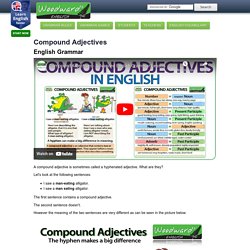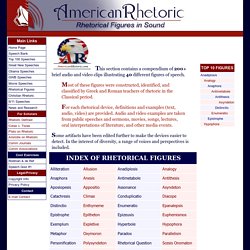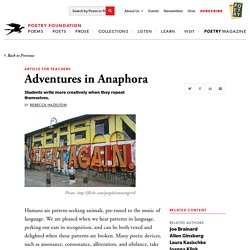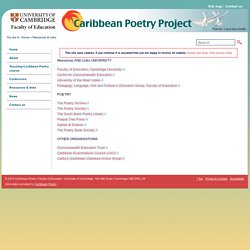

Compound Adjectives - English Grammar. A compound adjective is sometimes called a hyphenated adjective.

What are they? Let's look at the following sentences: I saw a man-eating alligator. I saw a man eating alligator. The first sentence contains a compound adjective. The second sentence doesn't. However the meaning of the two sentences are very different as can be seen in the picture below: BBC Learning English - Course: intermediate / Unit 20 / Grammar Reference. American Rhetoric: Rhetorical Devices in Sound. C.S.

Lewis: "Forget Psychology. Forget the inside of men's heads. Judge them by their actions. For example, Mr. Whistler is asleep. Peter Whistler: "Alright, I'm going. " Adventures in Anaphora by Rebecca Hazelton. Humans are pattern-seeking animals, pre-tuned to the music of language.

We are pleased when we hear patterns in language, perking our ears in recognition, and can be both vexed and delighted when those patterns are broken. Many poetic devices, such as assonance, consonance, alliteration, and sibilance, take advantage of our ability to perceive repetition, making them valuable tools when teaching poetry techniques to both beginning and more advanced students. In the classroom, anaphora can be particularly useful in drawing student attention not only to sound but also to concrete detail, metaphor, and rhetorical movement. Many of my beginning students enter the classroom with little previous knowledge of poetry, and some are already convinced that poetry is entirely foreign to their experience, possibly old-fashioned, and certainly not reader-friendly.
My more advanced students have other difficulties. We shall not flag or fail. I want to shake off the dust of this one-horse town. Literary Devices and Terms - Definitions and Examples. Acrostic An acrostic is a piece of writing in which a particular set of letters—typically the first letter of each line, word, or paragraph—spells out a word or phrase with special significance to the text. Acrostics... (read full acrostic explanation with examples) An acrostic is a piece of writing in which a particular set of letters—typically the first letter of each line,... (read more) Allegory An allegory is a work that conveys a hidden meaning—usually moral, spiritual, or political—through the use of symbolic characters and events.
Allusion In literature, an allusion is an unexplained reference to someone or something outside of the text. Anachronism. Rhyme Scheme - Examples and Definition of Rhyme Scheme. Caribbean Poetry, Faculty of Education, University of Cambridge » Resources & Links. Skip navigation Site map / Contact us You are in: Home » Resources & Links This site uses cookies.

If you continue it is assumed that you are happy to receive all cookies. Accept and close. Resources AND Links Faculty of Education, Cambridge UniversityCentre for Commonwealth EducationUniversity of the West IndiesPedagogy, Language, Arts and Culture in Education Group, Faculty of Education The Poetry ArchiveThe Poetry SocietyThe South Bank Poetry LibraryPeepal Tree PressApples & SnakesThe Poetry Book Society Commonwealth Education Trust Caribbean Examinations Council (CXC)CaribLit (Caribbean Literature Action Group) A guide to the language of Caribbean poetry. This guide by Pauline Christie is an excellent aide for anyone reading Caribbean poetry who wants a little extra insight to the language.

Christie clearly explains the grammar and vocabulary of Caribbean Creole with examples from a range of poems. Click here to download a pdf version of this article. English is the official language of all the Caribbean territories which were colonized by Britain. However, the everyday usage of most Caribbean speakers differs from Standard English (SE) to a greater or lesser degree.
There is in fact a wide range of usage stretching between Standard English and what is often referred to as Patwa (Patois) or Broad Creole. The language of the poems Most Caribbean poets write in both Standard English and some level of Creole, but in varying proportions. Since Caribbean Creole has traditionally been confined to oral use, there is no generally accepted spelling system.
Creole Grammar Parts of Speech Articles Definite: di (often written de) Indefinite: wan/ a. Comic Devices - Glossary. Comic Devices Verbal Irony – What is said/written is the opposite of the meaning.

When caustic or harsh, can be sarcasm. Example: "So anyway I feel terrible. " Tri-Cities and Fabio Have Ups and Downs, Dave Barry, page 1, line 72. Function: In this article, and the one before it, the author spent the whole time insulting and making fun of the Tri-Cities. Situational Irony – What happens is the opposite of what is expected. Example: "…when you require assistance there is never anyone around.
" Function: Most of the time, when in a store, the employees are offering help finding items or showing new sales. Dramatic Irony – A character is unaware of the context in which they are speaking. Example: "DID I have the chance to buy the first "Harry Potter" manuscript? Function: The writer doesn’t regret his decision to pass on the Harry Potter book, one of the most anticipated book of the year. NEA Big Read.